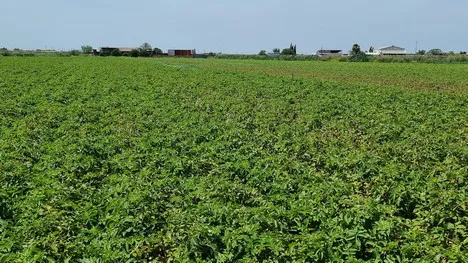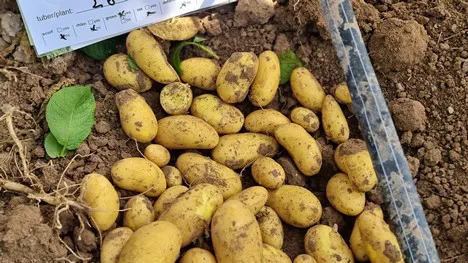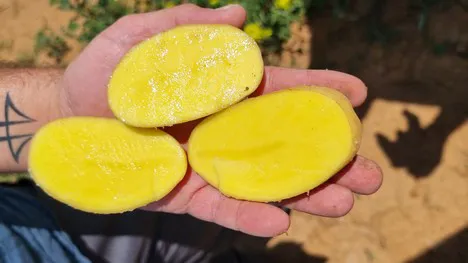This year's early potato harvest started in week 21 with the first grubbing of loose-skinned early potatoes for direct marketing. However, the first programs with regional, firm-skinned goods will probably not be available from retailers until week 26-27, expects Thomas Herkenrath (r), Managing Director of Fritz Jungnickel & Co in Neuss, who is also President of the German Potato Trade Association (DKHV). He spoke with us about the upcoming season, the current marketing of imported goods and the future of the German potato industry.
harvest started in week 21 with the first grubbing of loose-skinned early potatoes for direct marketing. However, the first programs with regional, firm-skinned goods will probably not be available from retailers until week 26-27, expects Thomas Herkenrath (r), Managing Director of Fritz Jungnickel & Co in Neuss, who is also President of the German Potato Trade Association (DKHV). He spoke with us about the upcoming season, the current marketing of imported goods and the future of the German potato industry.
 Potato production in Andalusia.
Potato production in Andalusia.
Potato warehouses are currently still well stocked in some regions, Herkenrath said. "There are still some stocks, especially in the north, with a high proportion of goods that retailers generally no longer want to market. However, there should still be demand from peelers and the export business, including from Poland, which is now receiving numerous refugees from Ukraine, who must be supplied accordingly."
On the domestic market, he said, consumption is now seasonally weak, mainly due to high temperatures and the May holidays. "On the other hand, we must not compare today's consumption with that of the Covid years, when we were able to achieve sales growth of up to 20 percent, especially at the beginning of the crisis. Compared to pre-Corona times, current demand is rather moderate to slightly below average."

Switch to imported goods from the Mediterranean is imminent
Meanwhile, imported goods from the Mediterranean are now trading a bit more briskly. "Alternative stocks, especially in southern Germany, have already been used up, which is why we are completely dependent on imports. Egypt and Israel still dominate the market. First retail programs with Spanish lots have been going on for about a week. At the beginning of June, many will switch completely from Egypt to Spain."
In contrast to the imports from Israel and Egypt, the Spanish early potatoes are processed and marketed immediately after harvesting, so we can rightly talk about fresh early potatoes. The cultivation volume of the export product in Egypt and Israel has been too high in some years, which in turn has put pressure on the price in Europe. Especially when at the end of the import season surplus volumes were still lying in cold stores and had to be marketed. In recent years, however, the volume planning of desert goods has improved considerably. This year, market observers see little need for adjustment going forward."
Israel and Egypt, the Spanish early potatoes are processed and marketed immediately after harvesting, so we can rightly talk about fresh early potatoes. The cultivation volume of the export product in Egypt and Israel has been too high in some years, which in turn has put pressure on the price in Europe. Especially when at the end of the import season surplus volumes were still lying in cold stores and had to be marketed. In recent years, however, the volume planning of desert goods has improved considerably. This year, market observers see little need for adjustment going forward."
More sensible and sustainable seasonal planning would generally be desirable, according to Herkenrath. "We get by until May with domestic produce from Germany or neighboring countries and need additional potatoes from Israel and Egypt from February to May. Only after that do early potatoes from Spain come in until we can get back in with firm-skinned, domestic produce."
After the end of the Spanish marketing window, domestic early potatoes will increasingly come to the fore. Here, he said, there is no reason to rush, because although no concrete figures are available yet, Herkenrath said a reduction in the area of table potatoes in Germany can be assumed. "We are facing a challenging campaign in which every tuber will be needed."
Self-sufficiency on the line?
"The Ukraine crisis is making grain cultivation increasingly interesting from a grower's point of view. In addition, there is the quality risk due to the high demands of the trade. For the future, there is a risk that producers will increasingly turn to growing other crops. We must not jeopardize our high degree of self-sufficiency with domestic potatoes," Herkenrath warns.
Images: Fritz Jungnickel GmbH & Co. KG
For more information:
Dipl.-Ök. Thomas Herkenrath
Fritz Jungnickel GmbH & Co. KG
Josefstrasse 120 - 122
D - 41462 Neuss
Tel: +49 (0)2131 - 56856-0
info@fjungnickel.de
www.fjungnickel.de
